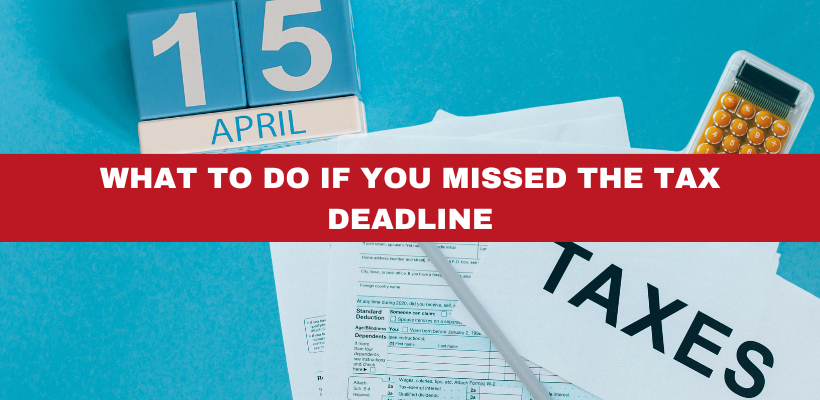Missing the IRS tax deadline can feel stressful, but you’re not alone, and more importantly: it’s not the end of the world. Every year, many taxpayers find themselves in the same situation for a variety of reasons. Whether you forgot to file, couldn’t get your paperwork together in time, underestimated how long the process would take, or weren’t able to pay what you owe, it’s important to remember that missing the deadline doesn’t automatically mean you’re facing severe consequences.
The IRS provides several options for taxpayers who fall behind, and by taking the right steps quickly, you can often reduce or even avoid some of the potential penalties. Acting promptly will help you regain control of your situation and prevent small issues from becoming bigger problems.
1. File your return as soon as possible.
If you missed the deadline, the most important thing you can do is file your tax return as soon as possible. The IRS imposes a Failure-to-File Penalty that grows larger the longer you wait. This penalty is typically 5% of the unpaid tax for each month (or part of a month) your return is late, up to a maximum of 25%.
Filing sooner stops the penalty from growing.
2. Pay what you can, even if it’s not everything.
Even if you can’t pay the full amount you owe, send as much as you can by the deadline or as soon as possible afterward. The IRS also charges a Failure-to-Pay Penalty, but it’s less severe than the penalty for not filing. It’s usually 0.5% of the unpaid tax per month, up to 25%.
Making a partial payment reduces this penalty and the interest that accrues.
3. Consider a payment plan.
If you can’t pay everything right now, the IRS also offers several options.
- Short-Term Payment Plans (for balances under $100,000)
- Long-Term Installment Agreements (for larger balances)
You can apply for a payment plan online, by phone, or by including Form 9465 when you file your return.
4. If you need more time to file, you may file for an extension before the deadline.
If you know ahead of time that you won’t be able to file by the April 15 deadline, you can file IRS Form 4868 to request an automatic six-month extension to file your return. This extends your deadline to October 15, but it does not extend the time to pay your taxes.
If you didn’t request an extension and missed the deadline entirely, it’s still better to file now than not at all.
5. If you are due a refund, there’s no penalty.
Here’s a silver lining: If you’re owed a refund and you didn’t file on time, there’s no penalty for filing late. However, you must still file your return within three years to claim your refund. After that, the money becomes property of the U.S. Treasury.
6. Avoid missing future deadlines (and issues).
Once you’ve filed and paid (or set up a payment plan), consider the following tips to avoid missing future deadlines:
- Set calendar reminders well in advance of April 15.
- Organize your tax documents as they come in.
- Work with a tax professional if you need help staying on track.
Final Thoughts
Failing to meet the IRS tax deadline can lead to penalties and interest, but taking quick action can significantly reduce the damage. The longer you wait to act, the more the penalties and interest can add up, making your tax situation even more difficult to manage. Filing your return as soon as possible, paying as much as you can upfront, and contacting the IRS to explore payment options are important first steps toward getting back on track. Even if you can’t pay the full amount right away, showing a good-faith effort to resolve your balance can prevent more serious consequences. The sooner you address the issue, the easier it will be to limit financial strain and put the problem behind you.







 Steven N. Klitzner, P.A. is a tax attorney based in Miami, Florida. He has been practicing tax law for over 40 years, and currently holds a 10.0 rating by Avvo. Mr. Klitzner was appointed to the IRS Service Advisory Council in 2021 and is...
Steven N. Klitzner, P.A. is a tax attorney based in Miami, Florida. He has been practicing tax law for over 40 years, and currently holds a 10.0 rating by Avvo. Mr. Klitzner was appointed to the IRS Service Advisory Council in 2021 and is... 





